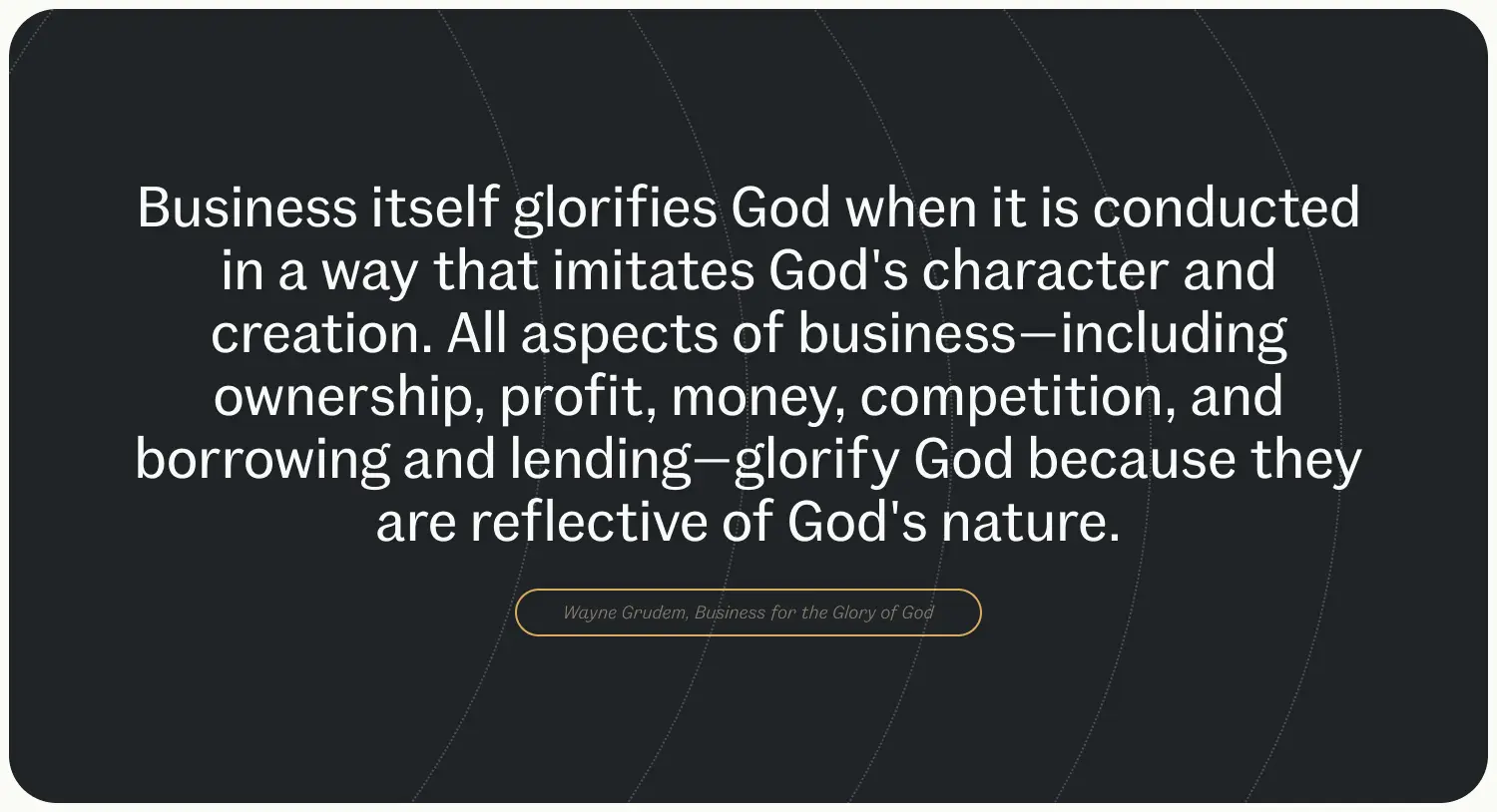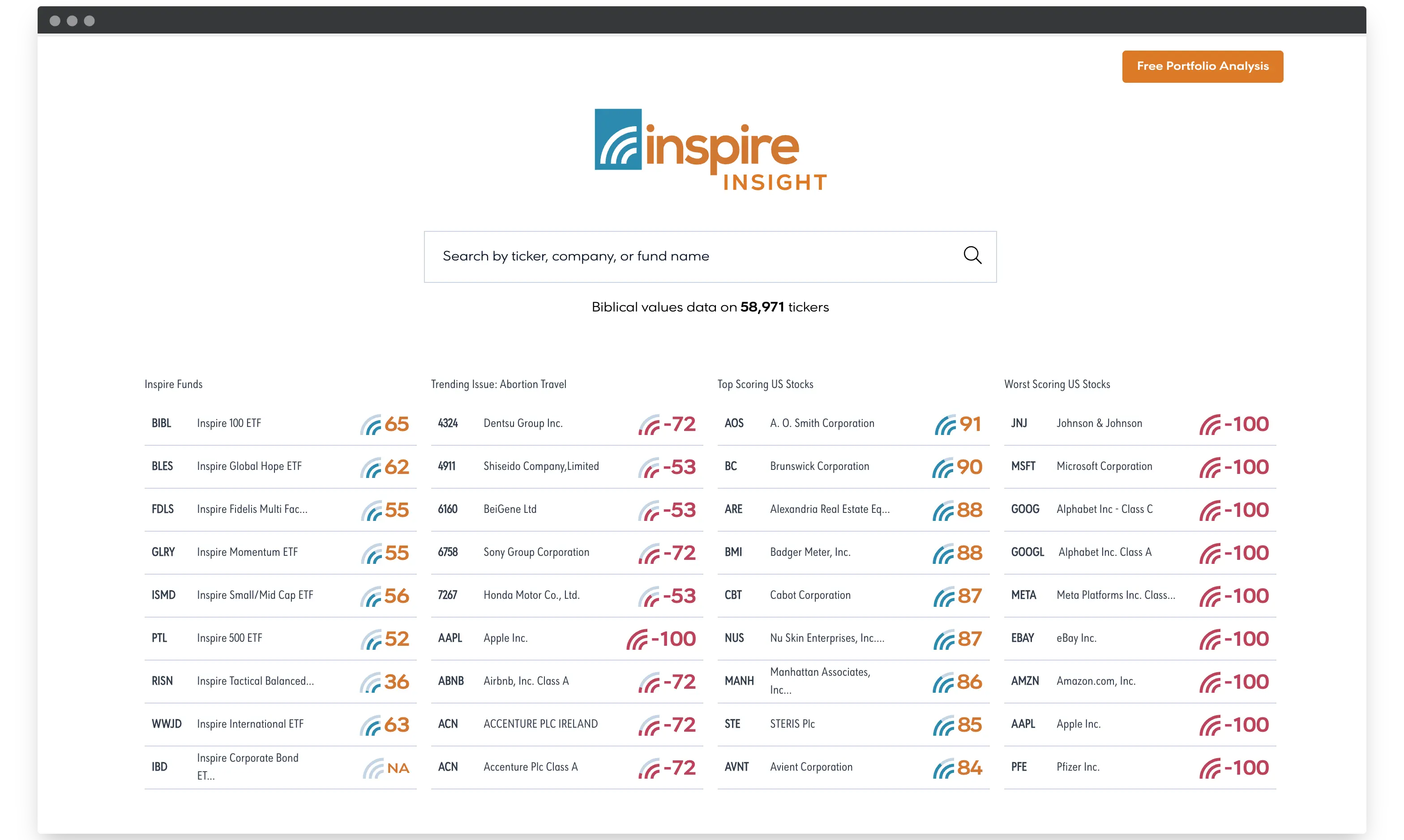Faith-Based Investing: A Complete Guide for Christians

Discover how faith-based investing lets Christians grow wealth while honoring God. Learn about BRI funds, biblical screening, performance data & strategies.
Here's something that might surprise you: Over $130 billion is now invested according to biblical principles. That's billion with a 'B.' And it's growing by 14% each year.
But here's what might surprise you even more: There's no conflict between growing wealth and honoring God when you understand what investing really means from a biblical perspective.
As a Christian financial advisor and Certified Kingdom Advisor®, I've discovered that many believers carry an unnecessary burden—they think investing and business are somehow at odds with their faith. This comes from a fundamental misunderstanding about what investing actually is.
Let me be clear: Business and investing, done biblically, ARE acts of faithfulness.
Here's why: The point of business isn't profit. Profit is simply a byproduct—a sign that you're creating value effectively. The true purpose of business is to meet people's needs more efficiently than they could on their own.
It's about fulfilling God's original commission in Genesis to rule the earth and subdue it—to bring creation to its highest and best use. The Hebrew word for 'subdue' (kabash) means to bring order and productivity to creation, not to exploit it. We're called to be co-creators with God, developing the earth's potential for human flourishing."It's about human flourishing. It's about fulfilling God's original commission in Genesis to rule the earth and subdue it—to bring creation to its highest and best use.
When you invest in companies that solve real problems and create genuine value, you're participating in God's work of blessing others. As Jerry Bowyer beautifully puts it, humanity and the earth "run on the same operating system"—we're fundamentally compatible, designed to be productive and creative together.

The tension many Christians feel isn't really about investing itself. It's about the difference between two models:
- The Biblical Model: Value creation—being a blessing to others and participating in human flourishing
- The Babylonian Model: Value extraction—taking from others without creating value
This guide will show you how to invest according to the biblical model, supporting companies that create genuine value while avoiding those that extract it through exploitation or harmful practices.
In this comprehensive guide, you'll discover:
- Why biblical investing is actually about participating in God's design for human flourishing
- How to identify companies creating real value versus extracting it
- The growing universe of investment options aligned with Kingdom principles
- Real performance data showing that doing good and doing well go hand in hand
- A practical framework for building a portfolio that advances God's kingdom
Most importantly, you'll learn how investing isn't a necessary evil or a compromise with worldly values. It's a powerful way to be a faithful steward who multiplies God's resources for Kingdom impact.
Because at Peak Financial Management, we believe managing wealth faithfully means actively participating in God's redemptive work through every financial decision we make.
Ready to discover how your investments can be a force for human flourishing? Let's dive in.
Section 1: What is Faith-Based Investing?

Faith-based investing starts with understanding what investing truly is: providing capital to businesses that solve problems and meet human needs. When done biblically, it's an expression of loving your neighbor.
Think about it: Every legitimate business exists to solve a problem. A farmer feeds people. A home builder provides shelter. A technology company connects communities. When you invest in these businesses, you're providing the resources they need to serve others.
Investing as Stewardship and Value Creation
The foundation of biblical investing rests on the truth that God owns it all (Psalm 24:1). But here's what that really means: We're not just caretakers preventing loss—we're active stewards called to be productive with God's resources.
Remember the Parable of the Talents (Matthew 25:14-30)? The master didn't condemn investing—he condemned the servant who buried his talent out of fear. The servants who invested wisely were commended. Why? Because they understood that resources should be productive, creating value for others.
This parable teaches us that:
- God expects us to be productive with His resources
- Creating value for others honors God
- Fear-based hoarding dishonors Him
The Biblical Model vs. The Babylonian System
Here's the crucial distinction:
The Biblical Model of Investing:
- Supports businesses that create genuine value
- Solves real problems for real people
- Leads to human flourishing
- Views people as producers made in God's image
- Operates on the principle: "The more I bless others, the more I'm blessed"
The Babylonian System:
- Focuses on value extraction
- Takes advantage of others' weaknesses
- Profits from addiction, exploitation, or harm
- Views people merely as consumers to exploit
- Operates on scarcity: "I must take from others to have more"
When you invest according to biblical principles, you're not choosing between returns and righteousness. You're choosing to earn returns BY creating value for others—which is exactly how God designed economics to work.
Understanding Biblically Responsible Investing (BRI)

Biblically Responsible Investing (BRI) simply means being intentional about supporting value creation while avoiding value extraction. It's not about accepting poor returns for the sake of righteousness—it's about recognizing that sustainable returns come from creating real value.
Different terms you'll hear:
- Faith-based investing
- Biblically Responsible Investing (BRI)
- Kingdom investing
- Values-aligned investing
They all point to the same principle: Investing in ways that advance human flourishing rather than undermining it.
Section 2: How Does Faith-Based Investing Work?

Now let's get practical. How do you invest in value creation while avoiding value extraction?
Investment Screening Methods
Think of screening as discernment applied to investing. You're distinguishing between companies that bless others and those that exploit them.
1. Avoiding Value Extraction: This means excluding companies whose primary business model depends on exploitation or harm. It's not legalistic rule-following—it's wisdom about what truly creates value.
2. Supporting Value Creation: Actively seeking companies that solve real problems, meet genuine needs, and contribute to human flourishing.
3. Engagement for Transformation: Sometimes the most powerful approach is buying shares to influence companies toward more value-creating practices—being salt and light in the corporate world.
While screening helps avoid harmful companies, the most powerful approach for public market investing might surprise you: engagement and proxy voting.
Think about it: When you buy shares in the secondary market, you're not giving money to the company—you're buying influence. That share comes with voting rights and a voice in corporate decisions.
This is the salt and light model in action. Rather than withdrawing from imperfect companies, Christian investors can:
- Vote proxies on crucial issues like executive compensation, environmental stewardship, and social policies
- Engage directly with management through shareholder proposals and dialogue
- Coalition build with other faith-based investors to amplify influence
- Transform from within rather than judge from without
At Peak Financial, we've seen companies change policies on predatory lending, improve labor practices, and enhance environmental stewardship—all through active ownership rather than avoidance.
Remember: Screening matters most in private markets where your capital directly funds operations. But in public markets, your voice might matter more than your avoidance.
Industries That Often Extract Rather Than Create Value
These industries often profit from weakness, addiction, or exploitation rather than meeting legitimate needs:
Predatory Lending
While lending can enable opportunity, predatory lenders trap desperate people in cycles of debt. This violates biblical principles about just lending practices.
Tobacco
Our bodies are temples of the Holy Spirit (1 Corinthians 6:19-20). Profiting from addiction that destroys health contradicts God's design for human flourishing.
Gambling
Casinos prey on desperation and false hope rather than creating real value. They extract wealth through exploitation of human weakness.
Pornography
This industry commodifies people made in God's image and profits from lust, destroying relationships and human dignity.
Abortion
Companies profiting from ending human life violate the biblical principle that all humans are made in God's image.
Industries and Companies That Create Genuine Value

Faith-based investing enthusiastically supports companies creating real value:
Healthcare Innovation
Companies like those developing insulin pumps for diabetics, creating prosthetics for amputees, or making life-saving drugs accessible to developing nations. Companies developing treatments, improving care, and making healthcare accessible participate in Christ's healing ministry.
Productive Technology
Businesses creating agricultural technology that helps farmers increase yields, educational platforms making quality learning accessible globally, or communication tools connecting isolated communities
Sustainable Agriculture
Companies helping feed the world while stewarding creation responsibly.
Education and Human Development
Businesses that help people develop their God-given potential and contribute to society.
Community Development
Financial institutions serving underbanked communities, businesses creating meaningful employment, and companies strengthening communities.
Clean Energy and Environmental Solutions
Companies solving environmental challenges while meeting energy needs reflect good stewardship of creation.
The key question isn't:
"Does this company ever do anything wrong?"
(In a fallen world, none are perfect.) The question is:
"Does this company's core business create value for others or extract it?"
Important note: Faith-based investing doesn't mean only investing in companies run by Christians or that market themselves as 'Christian businesses.' It means investing in ANY company—secular or religious—that creates genuine value for human flourishing. A secular company that develops clean water technology honors God's design more than a 'Christian' company engaged in predatory practices.
Section 3: Performance—Value Creation Wins Long-Term
Here's fantastic news: Companies that create genuine value tend to outperform value extractors over time. Why? Because God's economy is real, and His principles work.
The Performance Reality
Multiple studies confirm what the Bible teaches—businesses that bless others are blessed:
- Historically, the Catholic Values Index has delivered returns nearly identical to the S&P 500, but with a slight lag over most timeframes
- Eventide's Gilead Fund, focused on human flourishing, has consistently ranked in the top quartile
- Companies with strong stakeholder practices show better long-term performance
Why does value creation outperform? Several reasons:
- Sustainable Business Models: Companies creating real value build lasting customer relationships
- Innovation Advantage: Solving real problems drives innovation
- Risk Mitigation: Value creators avoid regulatory backlash and reputation crises
- Employee Engagement: People work harder for companies making a positive difference
- Customer Loyalty: Customers stick with companies that genuinely serve them
The Growth of Kingdom-Minded Investing
The explosive growth in faith-based investing reflects an awakening among Christians:
- Total assets: Over $130 billion and growing 14% annually
- Number of options: 200+ faith-based funds now available
- Mainstream adoption: Major institutions now offer faith-based options
This growth creates better options, lower costs, and stronger performance as more Christians recognize investing as stewardship.
Section 4: Getting Started—Your Practical Roadmap
Ready to align your investments with God's design for value creation? Here's how:
Step 1: Embrace Your Role as a Steward-Investor
First, reject the false dichotomy between faith and investing. Recognize that:
- You're called to be productive with God's resources
- Creating value for others IS faithful stewardship
- Your investments can advance God's kingdom
Step 2: Assess Your Current Portfolio
Review where your money is currently invested:
- Which companies are you supporting?
- Are they creating value or extracting it?
- How can you shift toward value creation?
Step 3: Choose Your Approach
You have several options:
Faith-Based Mutual Funds and ETFs
- Timothy Plan: Comprehensive biblical screening since 1994
- Eventide: Focus on human flourishing
- Inspire ETFs: Broad selection with competitive fees
- GuideStone: Serving Christians with values-based options

Direct Stock Investing
Use tools like:
- Inspire Impact Score (free at inspireinsight.com)
- Your own research into company business models
- Seeking companies solving real problems
Working with a Kingdom Advisor:
Partner with advisors who understand both financial stewardship and biblical principles.
Step 4: Start Where You Are
You don't need to change everything overnight:
- God can use our investments to advance His Kingdom
- Gradually transition existing holdings
- Focus on tax-efficient transitions
- Celebrate each step toward values alignment
Step 5: Think Kingdom Impact
Remember the bigger picture:
- Your investments provide capital for human flourishing
- You're participating in God's redemptive work
- Returns you earn can fund ministry and generosity
- You're modeling faithful stewardship for others
Common Questions Answered
"Isn't all investing just about greed?"
No! Investing, done biblically, is about providing resources for businesses to serve others. Profit is simply the reward for creating value effectively. The farmer profits by feeding people. The builder profits by providing homes. This is God's design—blessing others leads to being blessed.
"Should Christians avoid the stock market?"
The stock market is simply a tool for connecting businesses needing capital with investors who can provide it. Like any tool, it can be used for good or ill. Used wisely, it enables you to support thousands of businesses creating value worldwide.
"What about Jesus throwing out the money changers?"
Jesus opposed exploitation in the temple, not legitimate business. The money changers were extracting value through exploitation, not creating it through service. This actually supports the distinction between value creation and extraction.
"How do I know if a company creates or extracts value?"
Ask these questions:
- Does this company solve real problems for real people?
- Does its success depend on others' wellbeing or their weakness?
- Would the world be better or worse without this company?
- Does it treat all stakeholders fairly?
Conclusion: Investing as Kingdom Work
Here's the beautiful truth: When you invest according to biblical principles, you're not compromising between faith and financial wisdom. You're applying faith TO financial wisdom.
Every dollar invested in value-creating companies is a dollar working to advance human flourishing. Every share you own in a company solving real problems is participation in God's redemptive work in the world.
The $130 billion already invested according to biblical principles proves a movement is underway. Christians are discovering that their investments can be tools for Kingdom impact, not sources of spiritual compromise.
Remember: Business and investing aren't necessary evils in a fallen world. They're part of God's design for human flourishing. When we invest in value creation rather than value extraction, we're fulfilling our calling to be productive stewards who bless others.
Your portfolio can be an extension of your faith, a tool for loving your neighbor, and a means of advancing God's kingdom. The question isn't whether to invest—it's how to invest in ways that create maximum value for others while honoring God.
Your Next Steps
- Pray for wisdom in stewarding God's resources
- Reject the false tension between faith and investing
- Evaluate your investments through the lens of value creation
- Begin transitioning toward Kingdom-aligned investments
- Celebrate that your investments can advance human flourishing
Let Peak Financial Management Help
At Peak Financial Management, we understand that investing is stewardship. We help Christians build portfolios that create value for others while growing wealth for Kingdom purposes.
Our Certified Kingdom Advisors® will help you:
- Understand investing as value creation
- Identify companies advancing human flourishing
- Build a portfolio aligned with biblical principles
- Create comprehensive financial plans that honor God
Ready to discover how your investments can be a force for good?

Schedule your 25-minute consultation today. Together, we'll explore how you can be a faithful steward-investor who multiplies God's resources for Kingdom impact.
Because at Peak Financial Management, we believe growing wealth and honoring God aren't in tension—they're in harmony when you invest according to His design.
Ty Johnson, CFP®, CKA®, is a financial planner at Peak Financial Management, helping Christians understand investing as an opportunity for faithful stewardship and Kingdom impact.

Ready for Your Next Chapter?






